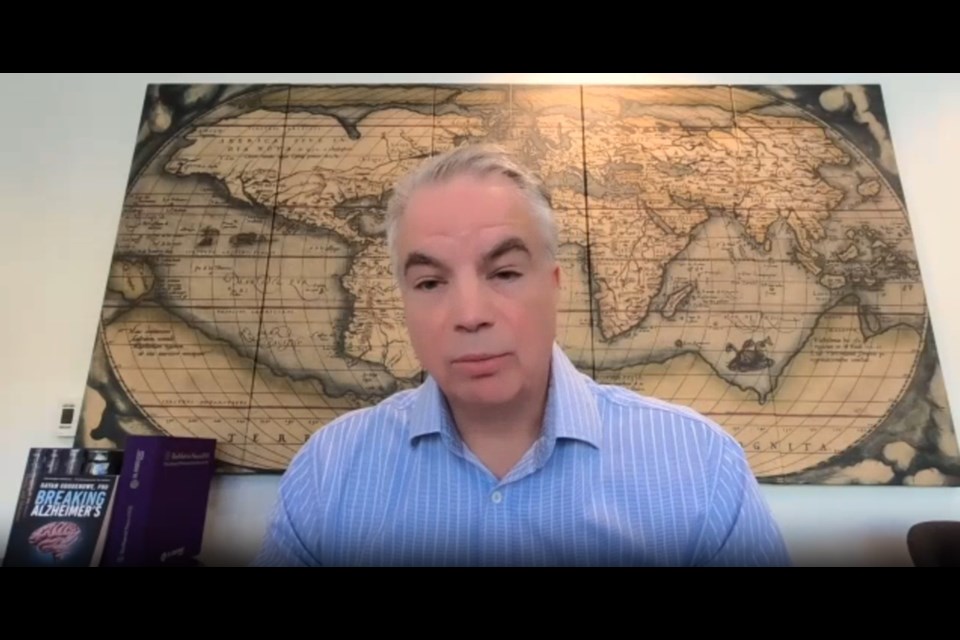MOOSE JAW — A Moose Jaw-born health-care professional whose work focuses on addressing various diseases using modern technology to restore people’s health is responding to a “disturbing” article the CBC published about him.
Dr. Dayan Goodenowe told MooseJawToday.com that the article was “quite disturbing” because he gave CBC plenty of information about his clinics’ work and clients’ success stories, but the broadcaster used none of it.
“… this is what disturbs me about the article, is that maybe they picked me as an easy target and it’s a high-prize thing,” he remarked.
The public broadcaster recently released “Hard to Swallow,” which criticized Goodenowe’s work helping patients with amyotrophic lateral sclerosis (ALS). ALS is a rare, terminal neurodegenerative disorder that results in the progressive loss of upper and lower motor neurons that control voluntary muscle contraction.
His research also focuses on reversing the effects of autism.
The feature-length article highlighted several American patients’ experiences and the concerns they — or their loved ones — had about their outcomes. Furthermore, it featured comments from a University of Alberta professor and the chief scientific officer at the ALS Society of Canada, while it questioned his medical credentials.
MooseJawToday.com spoke to Goodenowe twice for this story, once by phone and a second time online.
“It was a very false reporting (by CBC), to say the least … ,” Goodenowe said during the phone conversation. “This will not go over well for them.”
The health practitioner — his website says he is a PhD neuroscientist, biochemist, synthetic organic chemist, inventor and clinical research expert — said he would “probably” take legal action against Canada’s public broadcaster.
Yet, his bigger concern was that the article’s sources weren’t “vetted” since he provided the investigative journalist with clients who had experienced restored health. Furthermore, he said all the non-vetted sources were Americans and not from Moose Jaw.
“We’re local. We feel very passionate about the work we do (and the beliefs we have),” Goodenowe said. “We care deeply about every single person we work with, just like anyone in Moose Jaw does … . We’re in Moose Jaw for the long haul.”
Goodenowe has a community health centre in the Town ‘n’ Country Mall, the Prodrome Health Centre at 1350 Lakeview Road, and three other venues under construction. All are supporting The Moose Jaw Vitality Project (MVP), which he says will offer patients no-cost access to modern restorative health services and advanced health-monitoring technology.
During the online interview with MooseJawToday.com, the health practitioner said he was “quite surprised” by the CBC article since it inaccurately reflected the situation.
He noted that he spoke to the reporter over three interviews, invited him to a conference in San Diego, Calif., gave him tours of the Moose Jaw clinics, provided access to clients and offered success stories. He said he also offered to speak to the broadcaster’s experts, but that didn’t happen.
Moreover, he said he told the CBC reporter that his work isn’t about “curing” anyone but is about restoring clients’ health. He also said he’s never claimed to be, or presented himself as, a medical doctor.
Meanwhile, Goodenowe singled out comments he found “annoy(ing)” in the article about client Corey Mitchell, who suffered from ALS.
The health practitioner pointed out that Mitchell’s health was declining rapidly in autumn 2023, but after he received treatment in Moose Jaw, he could talk, walk and climb stairs. In July 2024, he visited Goodenowe’s California clinic and spoke for two hours for a promotional video.
“His fatigue was gone (and) he was walking across the room … ,” Goodenowe recalled. “And here’s a person that very clearly, unambiguously, was systematically improving from ALS.”
ALS is a dangerous disease, and even for people in recovery, they must still be vigilant, he continued. So, he thought it was unfortunate for CBC to suggest “that this was not real when you could see (the recovery) right in front of you.”
Mitchell’s health declined after he left California and he died on Oct. 21, 2024.
Goodenowe said his team is “not in the miracle business” but is in the “hard work business” of improving people’s health. He pointed out that people’s bodies have lost the ability to function normally, so his team helps restore them to a natural state.
Goodenowe added that he didn’t expect the article to hurt his business, while he was planning to hold health-related events in Moose Jaw soon.




